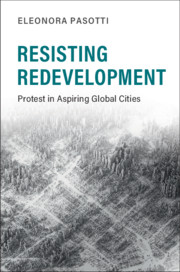Book contents
- Resisting Redevelopment
- Cambridge Studies in Contentious Politics
- Resisting Redevelopment
- Copyright page
- Dedication
- Contents
- Illustrations
- Acknowledgments
- Part I Setting the Comparison
- Part II Explaining Mobilization
- Part III Explaining Impact
- 9 Council Allies and Partisan Alignments
- 10 Shaping Redevelopment in Public Housing Estates
- 11 Militancy with a Twist
- 12 Conclusion
- Book part
- Bibliography
- Index
- Cambridge Studies in Contentious Politics
9 - Council Allies and Partisan Alignments
from Part III - Explaining Impact
Published online by Cambridge University Press: 09 March 2020
- Resisting Redevelopment
- Cambridge Studies in Contentious Politics
- Resisting Redevelopment
- Copyright page
- Dedication
- Contents
- Illustrations
- Acknowledgments
- Part I Setting the Comparison
- Part II Explaining Mobilization
- Part III Explaining Impact
- 9 Council Allies and Partisan Alignments
- 10 Shaping Redevelopment in Public Housing Estates
- 11 Militancy with a Twist
- 12 Conclusion
- Book part
- Bibliography
- Index
- Cambridge Studies in Contentious Politics
Summary
Chapter 9 focuses on protest impact. It begins by illustrating the role of partisan dealignment, with a discussion of Buenos Aires and Santiago. Cases in these cities followed different paths to mobilization, yet in both sites protest had high impact because organizers found allies at the national level. The chapter then illustrates the pivotal role of the councillor in single-member districts with two divergent cases in Toronto, in Mimico and Parkdale. These cases also illustrate the co-optation of the creative class by real-estate developers – an important lesson because signs indicate that co-optation will become more common. The chapter then examines impact under right-wing partisan alignment, an adverse setting for protesters. In Seoul, the same set of protest strategies led tosuccess in a leftist district (in the Duriban case), yet they failed in a conservative ward (in the Myeong-dong case). The final part of the chapter continues in Seoul, illustrating the change in protest following a shift from development regime to a progressive regime: In Mullae, cultural producers resisted displacement by infiltrating institutions and obtaining support through insider lobbying.
Keywords
- Type
- Chapter
- Information
- Resisting RedevelopmentProtest in Aspiring Global Cities, pp. 237 - 269Publisher: Cambridge University PressPrint publication year: 2020
- 1
- Cited by

